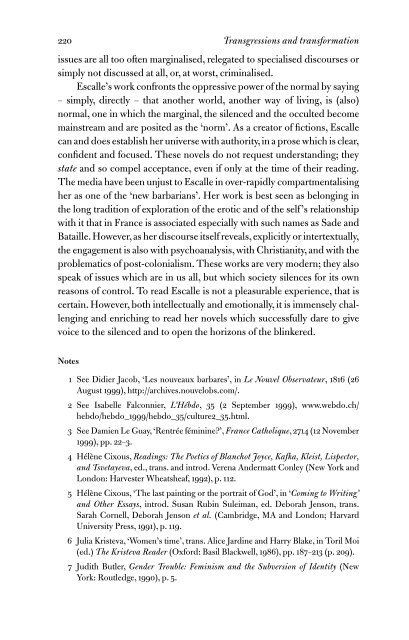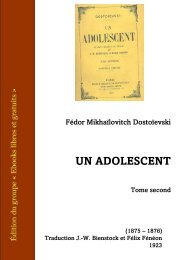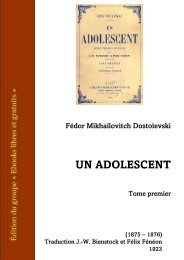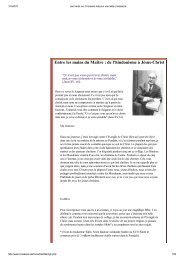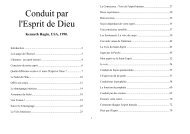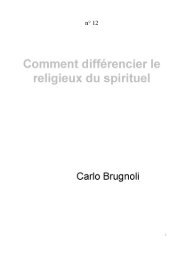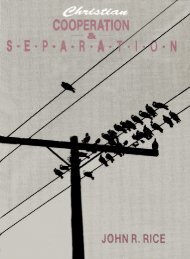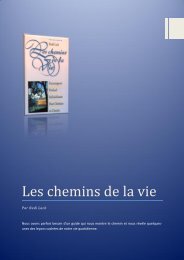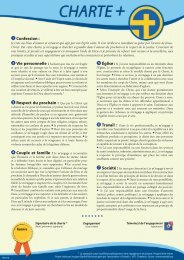Women writing in contemporary France
Create successful ePaper yourself
Turn your PDF publications into a flip-book with our unique Google optimized e-Paper software.
220 Transgressions and transformation<br />
issues are all too often marg<strong>in</strong>alised, relegated to specialised discourses or<br />
simply not discussed at all, or, at worst, crim<strong>in</strong>alised.<br />
Escalle’s work confronts the oppressive power of the normal by say<strong>in</strong>g<br />
– simply, directly – that another world, another way of liv<strong>in</strong>g, is (also)<br />
normal, one <strong>in</strong> which the marg<strong>in</strong>al, the silenced and the occulted become<br />
ma<strong>in</strong>stream and are posited as the ‘norm’. As a creator of fictions, Escalle<br />
can and does establish her universe with authority, <strong>in</strong> a prose which is clear,<br />
confident and focused. These novels do not request understand<strong>in</strong>g; they<br />
state and so compel acceptance, even if only at the time of their read<strong>in</strong>g.<br />
The media have been unjust to Escalle <strong>in</strong> over-rapidly compartmentalis<strong>in</strong>g<br />
her as one of the ‘new barbarians’. Her work is best seen as belong<strong>in</strong>g <strong>in</strong><br />
the long tradition of exploration of the erotic and of the self ’s relationship<br />
with it that <strong>in</strong> <strong>France</strong> is associated especially with such names as Sade and<br />
Bataille. However, as her discourse itself reveals, explicitly or <strong>in</strong>tertextually,<br />
the engagement is also with psychoanalysis, with Christianity, and with the<br />
problematics of post-colonialism. These works are very modern; they also<br />
speak of issues which are <strong>in</strong> us all, but which society silences for its own<br />
reasons of control. To read Escalle is not a pleasurable experience, that is<br />
certa<strong>in</strong>. However, both <strong>in</strong>tellectually and emotionally, it is immensely challeng<strong>in</strong>g<br />
and enrich<strong>in</strong>g to read her novels which successfully dare to give<br />
voice to the silenced and to open the horizons of the bl<strong>in</strong>kered.<br />
Notes<br />
1 See Didier Jacob, ‘Les nouveaux barbares’, <strong>in</strong> Le Nouvel Observateur, 1816 (26<br />
August 1999), http://archives.nouvelobs.com/.<br />
2 See Isabelle Falconnier, L’Hébdo, 35 (2 September 1999), www.webdo.ch/<br />
hebdo/hebdo_1999/hebdo_35/culture2_35.html.<br />
3 See Damien Le Guay, ‘Rentrée fém<strong>in</strong><strong>in</strong>e?’, <strong>France</strong> Catholique, 2714 (12 November<br />
1999), pp. 22–3.<br />
4 Hélène Cixous, Read<strong>in</strong>gs: The Poetics of Blanchot Joyce, Kafka, Kleist, Lispector,<br />
and Tsvetayeva, ed., trans. and <strong>in</strong>trod. Verena Andermatt Conley (New York and<br />
London: Harvester Wheatsheaf, 1992), p. 112.<br />
5 Hélène Cixous, ‘The last pa<strong>in</strong>t<strong>in</strong>g or the portrait of God’, <strong>in</strong> ‘Com<strong>in</strong>g to Writ<strong>in</strong>g’<br />
and Other Essays, <strong>in</strong>trod. Susan Rub<strong>in</strong> Suleiman, ed. Deborah Jenson, trans.<br />
Sarah Cornell, Deborah Jenson et al. (Cambridge, MA and London; Harvard<br />
University Press, 1991), p. 119.<br />
6 Julia Kristeva, ‘<strong>Women</strong>’s time’, trans. Alice Jard<strong>in</strong>e and Harry Blake, <strong>in</strong> Toril Moi<br />
(ed.) The Kristeva Reader (Oxford: Basil Blackwell, 1986), pp. 187–213 (p. 209).<br />
7 Judith Butler, Gender Trouble: Fem<strong>in</strong>ism and the Subversion of Identity (New<br />
York: Routledge, 1990), p. 5.


